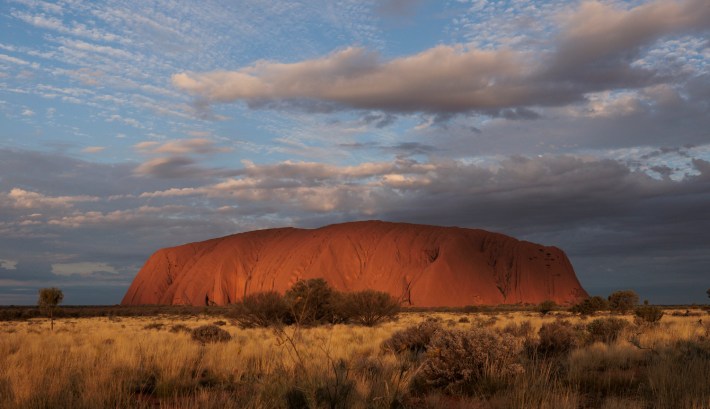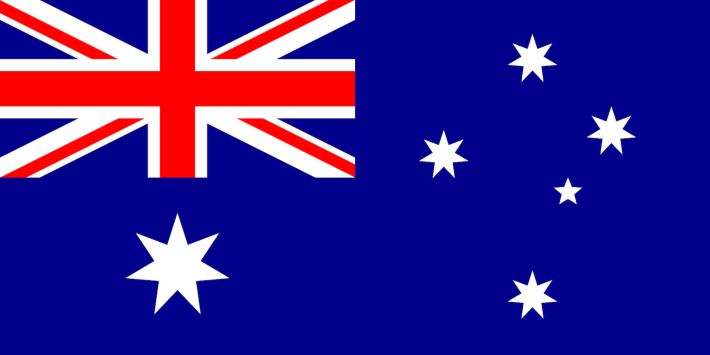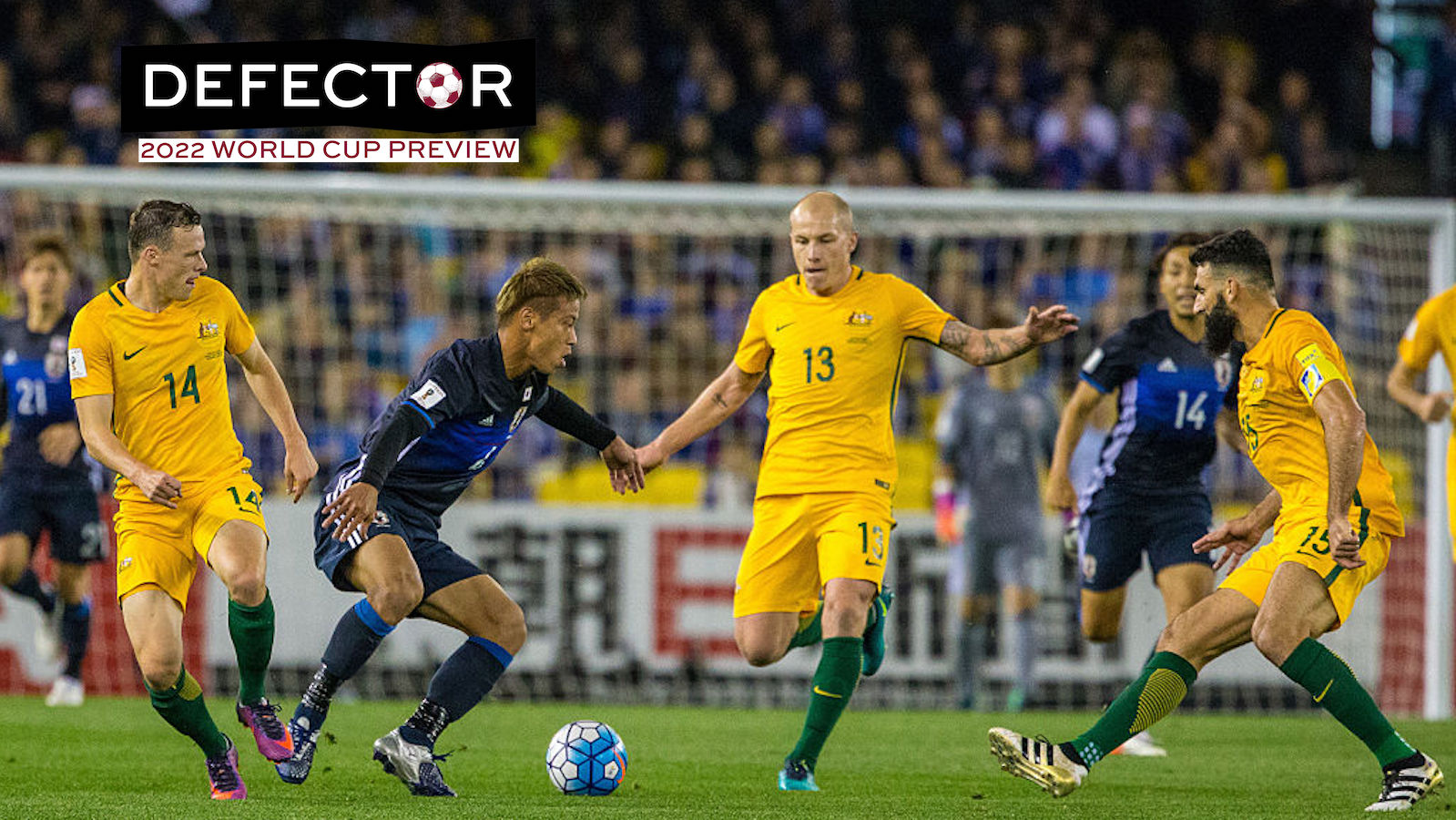It’s almost time for the 2022 World Cup. To help get you ready, we will be providing you with precious information about every team in the tournament. You can read all of our World Cup previews here.
In 2005, Australia switched soccer federations, leaving the barren Oceania Football Conference for Asia. Their reasons were pretty simple: The AFC offered the Socceroos better competition, the chance to play more regular games against competitive teams like Japan and Iran instead of the Cook Islands and Tuvalu, and, critically, a more straightforward path to the World Cup. Australia made the switch after finishing runners-up in six consecutive World Cup qualification playoffs, which is a frustrating and impressive record of futility. Every four years, their reward for being the big fish in a small pond (since it's the Pacific Ocean, it's more like a big fish in a huge pond stocked mostly with minnows) was a two-legged playoff with lesser CONMEBOL or UEFA teams, and every four years, they came up just short. Why get smoked by Uruguay and Scotland when you can give yourself 14 games to beat, say, Lebanon and South Korea?
But to qualify for the 2006 World Cup, they had to go through one final gauntlet, against Uruguay. Led by Tim Cahill, the greatest player to ever wear the Australia shirt, they won, qualifying for their second-ever World Cup and kicking off what looks like a new era for Australian soccer. They would go on to lose to eventual champions Italy in a nutty Round of 16 game, failing to score in 40 minutes of 11-on-10 soccer after Marco Materrazzi (who would of course go on to feature in the 2006 World Cup's biggest moment) earned a red card. Australia then ceded a soft penalty in the 93rd minute. That's as heartbreaking as it gets, especially in your first World Cup in 32 years.
Since 2006, Australia has qualified for every single World Cup, twice through the AFC group stage and twice the old-fashioned way. They have only won two games at the tournament in their brief history, though they're clearly trending in the right direction. They have been drawn into killer groups every time out, and 2022 features three of the four teams from their group in Russia (they beat the fourth, Peru, in a playoff a few months ago). The Socceroos get France first, Tunisia second, and Denmark third. The odds will be against them, which is a fine reason to support them. An even better one is the team's public comments on Qatar's human rights record.
Who Is Their Main Guy?
Ajdin Hrustic would be their main guy, though unfortunately, he just hurt his ankle last month and he'll miss the tournament. Of the group of veterans preferred by long-time head coach Graham Arnold, Aaron Mooy is probably the next best candidate for main guyhood. The defensive midfielder has been on the senior side for a decade now, and he's played the bulk of his club soccer right at the hinge between the Championship and Premier League. However, after helping Huddersfield Town get to the Premier League for the first time in club history then playing two seasons for Brighton, he took the soft retirement of going to play in China. That usually spells the end a veteran's career, or at least the end of the competitive portion of a career, though Mooy was signed by Celtic this offseason because he was so critical to getting Australia into the World Cup.
"With Aaron, I signed him pretty much on the back of him being the best player in the ground against Peru," Celtic manager Ange Postecoglou said. "He hadn’t played for ages before that. I’ve always known he’s a great player, I’ve worked with him. I just felt he still has plenty in him." To me that sounds like something you'd want to see from your team's main guy. Australia have played a lot of 4-1-4-1, with Mooy as the lone pure defensive midfielder, leaving him responsible for doing a lot of dirty work. He relishes that sort of thing, and he's weirdly swaggy on the ball for a bald guy who mostly loves to fight. As Postecoglou said, his best performances pretty much all come in an Australia shirt. So while he hasn't been very good for Celtic, that might not be all that relevant.
Who Is Their Main Non-Scoring Guy Who Will Score Goals?
We've altered the section title here because this candidate is a power forward-sized center back who has a hilarious goalscoring record for the national team. Harry Souttar, all 6-foot-7 of him, is recovering from a knee injury, though it seems like he will be in form by the time the World Cup kicks off. He's not very quick, obviously, though he moves pretty well for such a big guy. The thing that leaps off the screen is that he's pretty normally proportioned for a tall fella, and as much as the video below advertises "Crazy Defensive Skills & Tackles," what it really advertises is: this guy is huge.
Souttar was born in Scotland, came up through the Scottish youth setup, and debuted for Australia in 2019. He has 10 senior caps for Australia and six goals, including a pair of braces. Every single one of them has come on set pieces, and only one was not scored with his head. So yes, he's somewhat of a blunt object, and, yes, he is a nominal center back, but it would be really funny if he puts two past France or something, because he's capable!
Where's The Beef?
Which teams or players does Australia not like? Do Australia's players like each other? We investigate Australia's potential enemies.
As Australia is not a big-time soccer nation who just joined a new region a few years ago, they don'thave any obvious rivals besides New Zealand. But the Kiwis are still in Oceania, and until the two nations played a pair of friendlies to mark the 100th anniversary of the rivalry, they hadn't faced each other in 10 years and hadn't played in a competitive match in 18 years. Geography dictates that rivalry will always simmer at some level, though without a competitive framework, it becomes less serious.
Most Likely To Go David Ospina Or James Rodríguez Mode
Who is Australia's best candidate for a breakout performance that earns them a career-changing transfer? Might this potential post-tournament transfer go well, like when Colombia's James Rodríguez went to Real Madrid after starring in the 2014 World Cup? Or could it go poorly, like when Colombia's David Ospina went to Arsenal after starring in the 2014 World Cup?
If Garang Kuol makes the team, and he should, he will be one of the youngest players to take the pitch at the 2022 World Cup. Kuol, who just turned 18, was born in 2004 to Sudanese parents who left Khartoum for Egypt and then Australia. He signed with Central Coast Mariners in 2021 one year after his older brother Alou did, and despite playing in only 11 A-League games, he's already distinguished himself as Australia's best soccer prospect. Things moved rapidly for the Kuol family: Alou moved to Stuttgart within one year of joining CCM, Garang made his senior debut in April 2022 (shortly before nearly scoring the goal of a lifetime against Barcelona in an exhibition), and both brothers started featuring for youth national teams as soon as their careers started. Garang made his full debut in Australia's September friendlies against New Zealand, one week after signing for Newcastle United.
That may make him a somewhat odd candidate for a James Rodríguez-style move, as he already has a big transfer that will go through in Jan. 2023. However, Kuol is extremely hyped and if he has a World Cup moment, it would accelerate his progress and could earn him more playing time with the Magpies, or a better loan in Europe, or even a transfer battle. With the obvious caveats that he's basically played no top-level soccer, he is super exciting and I hope Australia lets him cook.
David Ospina Mode Probability Score: 10.2
James Rodriguez Mode Probability Score: 71.1
Fun Geographical Fact
Almost every geographical fact about Australia is a "fun geographical fact," as it's such an extreme place. Presumably you know about the Great Barrier Reef, the desolation of the Outback, and the man-killing magpie colonies in New South Wales. Maybe you also know about Uluru, or Ayers Rock, though I'm so fascinated by it that I think it bears re-centering. Rising over 1,000 feet out of a flat plains floor, Uluru is a beautiful sandstone monolith. Given its prominence, inexplicable beauty, and location within central Australia, it makes a lot of sense that local Aṉangu peoples have revered it as a holy site for millennia. It appears to rise up out of nowhere to a stunning height, emerging from the desert like something alien and foreboding.

Since 1985, stewardship of Uluru has been in the hands of the Aṉangu, though it's jointly managed with the Australian state. Tourists have loved to climb in the rock for years, which, as you can imagine, is not something people appreciate being done on/to their holy site. Thankfully, you can't climb up it anymore.
Good Flag Or Bad Flag?

This flag is pulling in two different directions, one good, one bad. Union Jack? Flag is wack. Stars on field? Flag's good side, revealed. Ultimately, the top left corner is far too irksome to offer any opinion on this flag other than: It's bad.
Good Anthem Or Bad Anthem?
The Australian national anthem has been the subject of a remarkable amount of push and pull. Some Scottish guy wrote "Advance Australia Fair" in 1878 after attending some sort of event where people were singing various national anthems, and when he realized Australia, which was then not a nation, didn't have one, he wrote one of his own for them. Sure, whatever man, sounds good. In 1973, Prime Minister Gough Whitlam wanted Australia to have its own song, so he put three songs to a vote. Two of them—"Advance Australia Fair" (eh) and "The Song of Australia" (boring)—were bad, but "Waltzing Matilda" was a slapper. It's an Australian folk dong about a "jolly swagman camped by a billabong" who turns into a ghost and haunts a watering hole. That shit rules. Sadly, "Advance Australia Fair" won the vote, and though "God Save The Queen" was briefly reinstated (have some self respect) under Whitlam's successor Malcolm Fraser, the public voted a few years later to bring back "Advance Australia Fair." They changed the lyrics in 2021 to make them less racist, which is good. Also, the music sounds correctly grandiose. Really my beef here is no "Waltzing Matilda."
Notable Moment In World Cup History
To progress to that aforementioned 2006 World Cup Round of 16 game with Italy, Australia had to earn at least a point against Croatia in their final group stage game. Australia is home to a large Croatian expat community, so the ties between the two nations suffused the game with even more nervous energy than the final round of a group stage normally would have. Croatia needed a win, so they gunned for the Aussie goal with abandon, leading to an open game with chances aplenty for both sides. Darijo Srna scored a banger in the second minute of the game, only for Australia to equalize after Croatia gave up a dumb handball penalty in the 38th. But shortly after halftime, Croatia struck again, as the Socceroos' Croatian-Australian keeper Zeljko Kalac fumbled a relatively simple ball and let Niko Kovac score the go-ahead goal in the 56th.
But they were not dead, and after Harry Kewell smashed home a bouncing ball in the box, pandemonium ensued. Croatia completely melted down. Dario Šimić flipped out and got a second yellow card. Minutes later, Australia's Brett Emerton, carded in the wake of the goal, was also sent off. Josip Šimunić provided the coup de grace at the end of normal time when he received his second yellow card at the 90th minute, then, somehow, his third yellow card three minutes later. Fantastic. If you are going to get bounced from the World Cup, make it count.
How Can They Win The World Cup?
In the southern hemisphere, which is where Australia is, water spins around in a different direction than it does in the northern hemisphere, due to the Coriolis effect. The theory here is that Australian players would score more goals and feel more comfortable in an environment where things spin their preferred way. Qatar is in the northern hemisphere, of course, but the magnetic field of the Earth reverses every half-million years or so. Does that have any bearing on the Coriolis effect, which would then have some bearing on Australia's World Cup fates? Maybe not; there's no evidence of anything like that However, there is also not any evidence that this isn't the case, so Australia can win the World Cup if the Earth's magnetic field reverses polarity.






